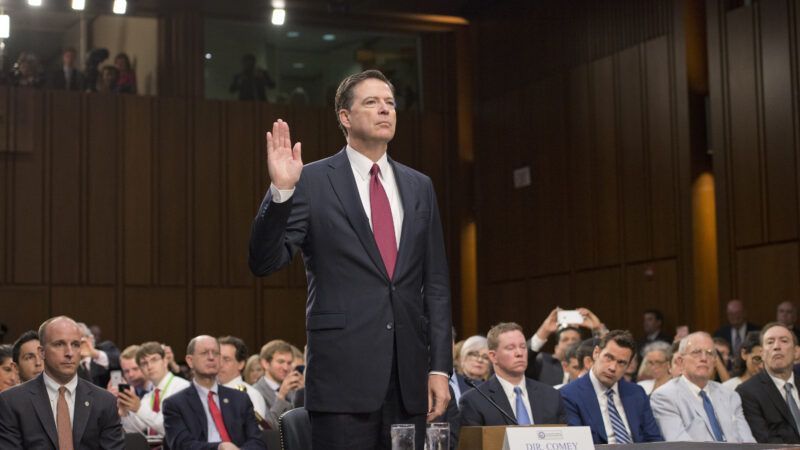James Comey Indicted in a Case Prosecutors Don't Seem Excited About
There is ample evidence to suspect prosecutors are just doing President Trump's dirty work rather than following the facts of the case.

This week, a federal grand jury indicted former FBI Director James Comey, a longtime antagonist of President Donald Trump—even though federal prosecutors don't seem entirely confident in the case.
According to the brief indictment signed by Lindsey Halligan, acting U.S. attorney for the Eastern District of Virginia, Comey is charged with one count of lying to Congress and one count of obstructing a congressional proceeding; each is a felony carrying a sentence of up to five years in prison. The grand jury apparently declined to indict Comey on a second count of lying to Congress.
"My heart is broken for the Department of Justice, but I have great confidence in the federal judicial system," Comey said in a brief Instagram video. "I'm innocent, so let's have a trial, and keep the faith."
"No one is above the law," Attorney General Pam Bondi wrote on X, without mentioning Comey by name. "Today's indictment reflects this Department of Justice's commitment to holding those who abuse positions of power accountable for misleading the American people. We will follow the facts in this case."
But there is reason to suspect prosecutors are doing Trump's dirty work by bringing a punitive case rather than simply "following the facts."
During his first term, Trump famously fired Comey for not dropping an investigation into Russian interference in the 2016 election. The president has apparently had it in for him ever since, calling him "a stupid son of a bitch" on Joe Rogan's podcast last year.
The indictment claims Comey lied during Senate testimony on September 30, 2020. At a hearing on that day, Sen. Ted Cruz (R–Texas) asked if Comey stood by a previous claim that he had never "been an anonymous source in news reports" about investigations related to the 2016 election; Comey said he had not.
The timing is important, as the five-year statute of limitations would have run out next week. "Assuming you decide to move forward with the Comey case—you face an immediate problem: What should you charge him with?" Benjamin Wittes and Anna Bower wrote at Lawfare earlier this week. "Trump wants Comey charged and is convinced he's guilty of something, and it's your job now to figure out what….It might just be possible to slap together a simple false statements case and get it in under the wire."
Last week, Trump fired Erik Siebert, his appointed U.S. attorney for the Eastern District of Virginia, reportedly for not bringing politically motivated prosecutions. Trump then nominated Halligan, one of his personal attorneys, to replace Siebert. Halligan had no experience as a prosecutor and little experience in federal court, but The New York Times referred to her as "a go-for-the-jugular loyalist."
The day after firing Siebert, Trump criticized Bondi in a post on Truth Social, saying the Department of Justice (DOJ) was "all talk, no action" because it had yet to bring charges against his political nemeses, including Comey.
It seems Bondi had reservations just like Siebert did: CNN reported Thursday, "Bondi had concerns about the case." ("That is a flat out lie," Bondi replied.)
"After a two-month investigation, federal prosecutors in Virginia were unable to gather sufficient evidence to support bringing criminal charges against former FBI Director James Comey for allegedly lying to Congress," ABC News reported Thursday. "The prosecutors earlier this week summarized their findings—that probable cause does not exist to secure an indictment, let alone a conviction at trial—in a detailed declination memo for Lindsey Halligan."
This suggests prosecutors faced a dilemma: bring a potentially meritless case, or get fired and replaced with someone who will. It also suggests Halligan had no qualms about bringing a meritless case if it's what her boss wanted.
This isn't to say Comey is above reproach. After Trump fired him, Comey shared memos with others about his interactions with the president, with instructions to give them to the press—violating FBI policy. While not an earth-shattering scandal, lesser mortals have gone to prison for far less. In fact, in one of the memos, Comey recalls telling Trump he "was eager to find leakers and would like to nail one to the door as a message."
But it seems the DOJ isn't going after Comey because it believes there's a strong case; prosecutors are merely placating the president by punishing his perceived enemies.
